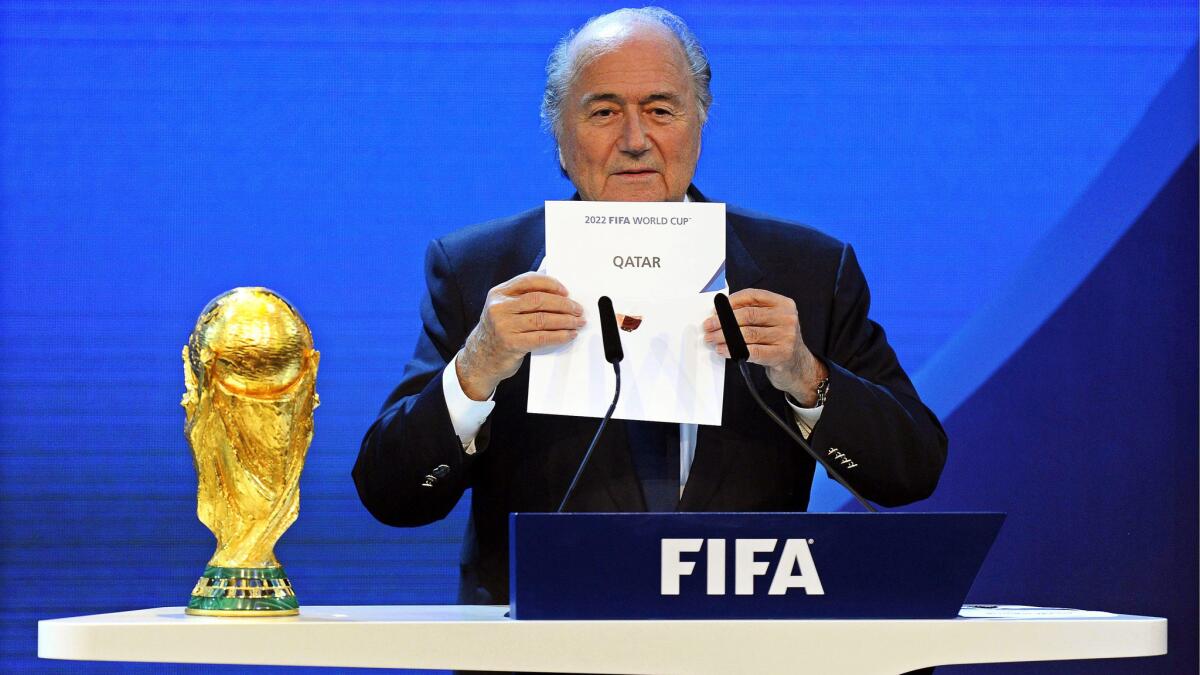FIFA task force recommends November-December World Cup for Qatar

- Share via
FIFA has finally agreed with what the rest of the world has been telling it for more than four years -- namely that summers in Qatar are too hot for soccer.
So on Tuesday a FIFA task force recommended that the 2022 World Cup in Qatar be moved to November and December rather than June and July, the traditional dates for soccer’s most important tournament.
Daytime summer temperatures in Qatar regularly exceed 105 degrees, conditions that would endanger the health of both players and fans. But by late fall and early winter average temperatures drop to the mid-70s.
Task force chairman Sheikh Salman bin Ebrahim Al-Khalifa of Bahrain, president of the Asian Football Confederation, also recommended that the 2022 tournament be shortened by a few days. One schedule that has reportedly been discussed would have the tournament opening on Nov. 26 and finishing on Dec. 23. That would make it, at 27 days, five days shorter than last summer’s World Cup in Brazil.
Tuesday’s recommendation is expected to be ratified by FIFA’s executive committee when it meets in Zurich, Switzerland, next month. But the decision won’t be popular or without controversy because it could force most the world’s top soccer leagues to alter their schedules for as many as two seasons to accommodate the first World Cup to be played in the Northern Hemisphere’s winter.
Major League Soccer, the top league in U.S., would be largely unaffected since its season runs from March through October.
Richard Scudamore of the English Premier League, who is a member of the task force, expressed the displeasure of European leagues and players.
“Very disappointed that’s the word, I think, on behalf of all the European leagues and particularly the European clubs who provide most of the players for this World Cup,” Scudamore told Agence France-Presse.
He added he felt “let down” by European football’s governing body, UEFA, which has already accepted a switch to winter.
“FIFA keep their international dates, they keep their World Cup intact, even UEFA, who, I think, let us down a little bit, clearly pushed this ... so their Champions League can start and carry on again, just like it always does,” he said.
Frederic Thiriez, president of France’s Ligue 1 and of the European Professional Football Leagues, also expressed his dismay.
“It is the worst solution. We are going to stop in November after 13 or 14 games and start again in January. In the meantime, players will not play, the clubs will not make any money, the fans will be deprived of national competitions and television companies will be furious,” he told AFP.
As a result, debate over the tournament schedule is likely to continue up until the executive committee meeting, which begins March 19. Other dates reportedly considered included May-June of 2022, which was dismissed because of heat concerns, and January-February 2023, which would compete with the Winter Olympics and no doubt draw protests from the International Olympic Committee.
FIFA’s decision to award the 2022 World Cup to the tiny Arab country has been controversial from the start -- and not just because of the harsh weather conditions. There have been strong and repeated allegations that the vote to place the tournament in Qatar and not the U.S. was rife with corruption, for example. And opposition to a Qatar World Cup has also focused on the country’s treatment of foreign workers and on laws banning homosexual acts.
More to Read
Go beyond the scoreboard
Get the latest on L.A.'s teams in the daily Sports Report newsletter.
You may occasionally receive promotional content from the Los Angeles Times.











